Discrimination in the workplace can cause profound emotional distress and financial setbacks. Many claimants pursue a discrimination lawsuit settlement to address these harms, but the process of deciding what to ask for in a discrimination settlement can feel overwhelming. From obtaining financial compensation to advocating for workplace improvements, a well-rounded settlement helps ensure justice is served and your career remains on track.
At Sparrow, we specialize in assisting claimants through discrimination and retaliation settlements. Our team provides clear guidance on what to include in your settlement request, ensuring that your compensation reflects both the financial and non-monetary damages you’ve experienced. With Sparrow’s support, you can navigate this complex process confidently and achieve a resolution that addresses all aspects of your claim.
Drawing on our extensive experience, we’ve compiled this guide to help you determine what to ask for in a discrimination settlement. From financial compensation to policy reforms, this article covers key considerations to ensure fair compensation, essential steps for filing a class action lawsuit, and how to document your agreement effectively.
Let’s get started!
Key Aspects to Request in a Discrimination Settlement
A well-negotiated settlement should address the full scope of potential damages caused by discrimination, from financial losses to emotional and professional impacts. Understanding what to ask for in a discrimination settlement ensures that no critical aspect is overlooked.
Discrimination in the workplace may occur in various forms, including racial discrimination, age discrimination, disability discrimination, gender discrimination (may be either based on sexual orientation or gender identity), and discrimination based on national origin, to name a few.
Here’s what to ask for in a discrimination settlement when it comes to compensation:
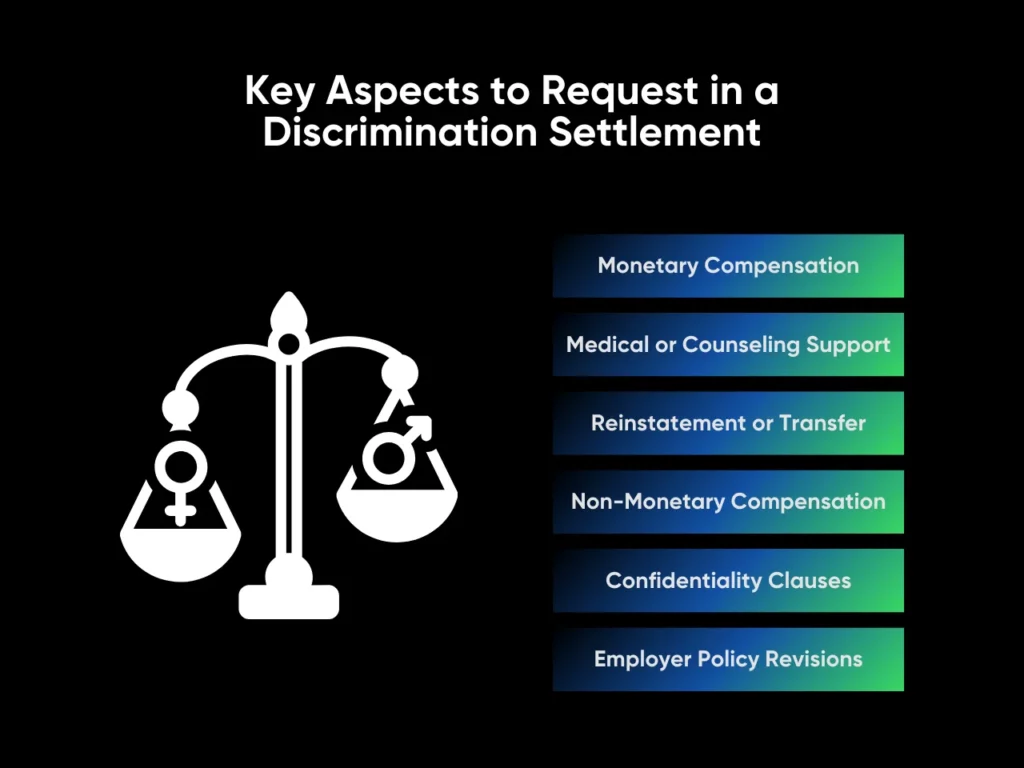
Monetary Compensation
Monetary reparations are the foundation of most discrimination settlements, addressing both tangible financial losses and the emotional toll of discriminatory practices.
- Back Pay: Recover wages and benefits lost due to unfair termination, demotion, or denied promotions. Back pay bridges the gap between what you earned and what you should have earned.
- Front Pay: Compensates for future lost income if returning to work is not feasible. This ensures financial stability while pursuing new opportunities.
- Compensatory Damages: Covers emotional distress, humiliation, and mental anguish caused by workplace discrimination.
- Punitive Damages: Reserved for cases involving egregious misconduct, punitive damages penalize the employer and deter future violations.
Medical or Counseling Support
Workplace discrimination often has a lasting impact on mental health. Including provisions for medical or counseling support in your settlement ensures access to necessary care.
Here’s what to ask for in a discrimination settlement related to health:
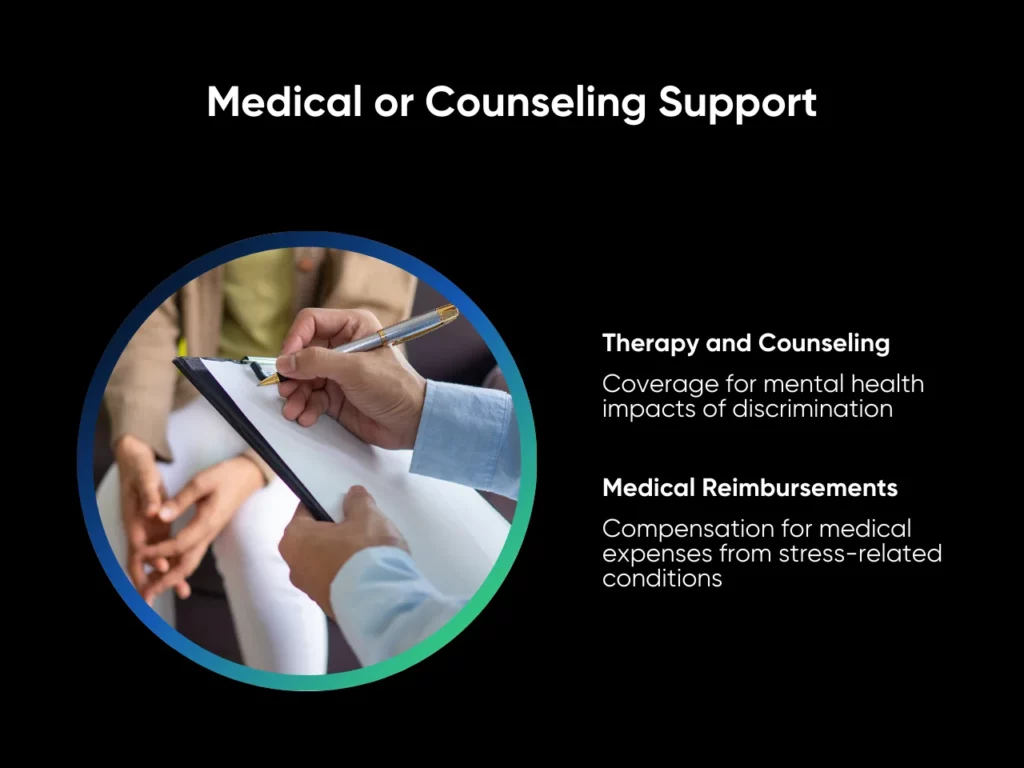
- Therapy and Counseling: Coverage for mental health services to address trauma, anxiety, or depression caused by the discriminatory experience.
- Medical Reimbursements: Compensation for medical expenses related to stress-induced conditions, such as migraines or hypertension.
Employment Reinstatement or Transfer Options
If career recovery is a priority, knowing what to ask for in a discrimination settlement can help you regain professional stability. Depending on your circumstances, consider:
- Reinstatement: Returning to your previous role under improved conditions and with assurances of non-retaliation.
- Transfer Opportunities: Moving to a new department or location to avoid a hostile work environment and start fresh.
Non-Monetary Compensation
Career growth opportunities are an essential aspect of addressing the long-term professional harm caused by discrimination. Non-monetary remedies are often overlooked but are vital in restoring professional progress.
Here’s what to ask for in a discrimination settlement for career restoration:
- Promotion: Securing a well-deserved promotion that was previously denied due to bias.
- Paid Training or Certifications: Employer-funded career development programs to strengthen your professional skill set and open new doors.
Confidentiality Clauses
Confidentiality clauses are often included in discrimination settlements, but their implications should be carefully evaluated.
- Advantages: Protects your privacy and shields you from potential professional repercussions.
- Disadvantages: Limits your ability to publicly discuss the case, reducing awareness of systemic workplace discrimination.
Employer Policy Revisions
Requesting workplace reforms in your settlement can create lasting change and reduce the likelihood of future incidents. Consider advocating for:
- Policy Enhancements: Updates to anti-discrimination policies and the introduction of clearer complaint procedures.
- Mandatory Training: Company-wide diversity, equity, and inclusion training to promote awareness and accountability.
Ensuring Fair Representation and Legal Support
Securing experienced legal representation is one of the most critical steps in knowing what to ask for in a discrimination settlement. Lawyers who specialize in employment discrimination bring the expertise needed to navigate the complexities of the legal system, ensuring that you are fully informed and that every aspect of your claim is addressed.
Here’s why having the right legal support matters and how it can directly impact the outcome of your settlement:
Why Legal Representation Is Essential
Dealing with discrimination in the workplace is already challenging, and navigating the legal process without professional help can be overwhelming. Experienced discrimination lawyers well-versed in employment law will have your best interest at heart and will craft your discrimination claim based on the specific circumstances of your case.
An experienced attorney with a track record in handling employment discrimination lawsuits can help you by:
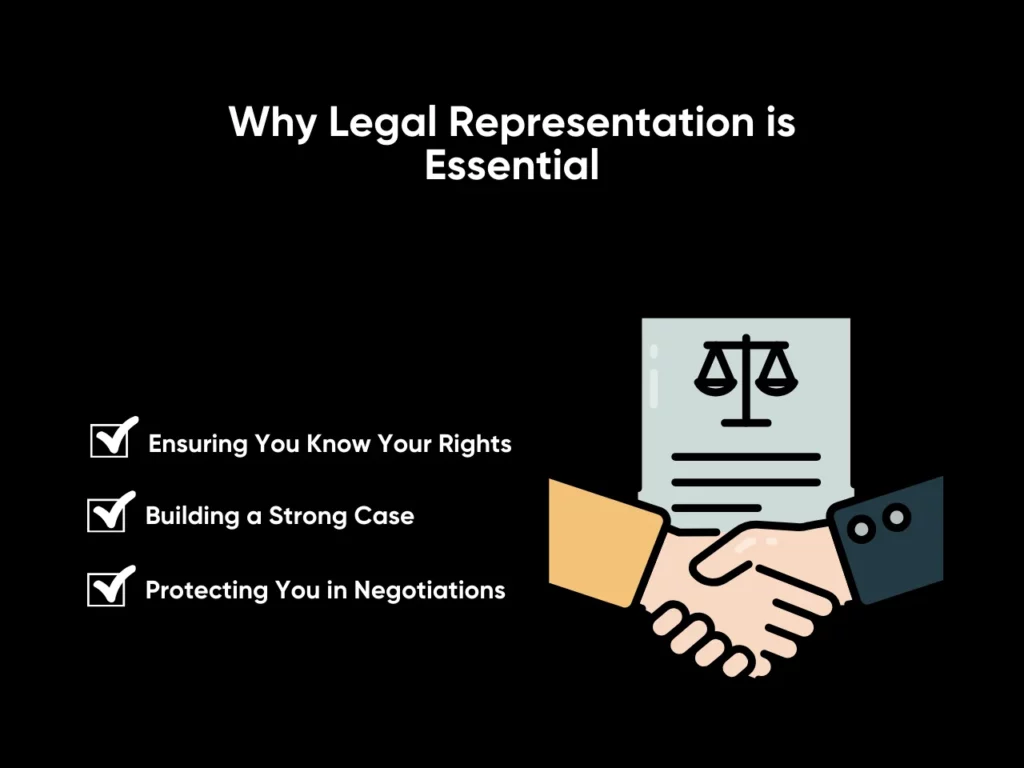
- Ensuring You Know Your Rights: Many individuals are unaware of the full range of remedies available in discrimination cases. A lawyer ensures you understand all potential claims, including financial compensation, career-related remedies, and requests for workplace changes.
- Building a Strong Case: Legal experts can analyze the details of your situation, gather strong evidence, and build a compelling case that highlights the impact of discrimination on your career, finances, and emotional well-being.
- Protecting You During Negotiations: Employers and their legal teams often try to minimize settlement amounts. A good attorney knows the value of your case and can help you present solid evidence to improve the terms of the settlement that you will receive.
Navigating Legal Complexities with Confidence
Employment discrimination cases often involve confusing legal language, tight deadlines, and intricate procedures. Having an experienced lawyer by your side simplifies the process and helps avoid costly mistakes.
- Decoding Legal Terms: Settlement agreements frequently include complex clauses, such as confidentiality provisions, non-disparagement agreements, or waivers of future claims. Your attorney will break down these terms and ensure you understand their implications.
- Drafting and Reviewing Settlement Agreements: A well-drafted agreement is essential to protect your rights. Attorneys ensure all terms, including financial and non-monetary remedies, are accurately represented and enforceable.
- Meeting Deadlines: Legal proceedings have strict timelines for filing complaints, submitting documentation, or responding to offers. Missing these deadlines can jeopardize your claim. Your attorney ensures everything is submitted correctly and on time.
Maximizing Your Settlement
One of the most significant benefits of legal representation is ensuring you receive fair compensation. Lawyers with expertise in discrimination cases have the knowledge and experience to secure a settlement that truly reflects the harm you’ve endured.
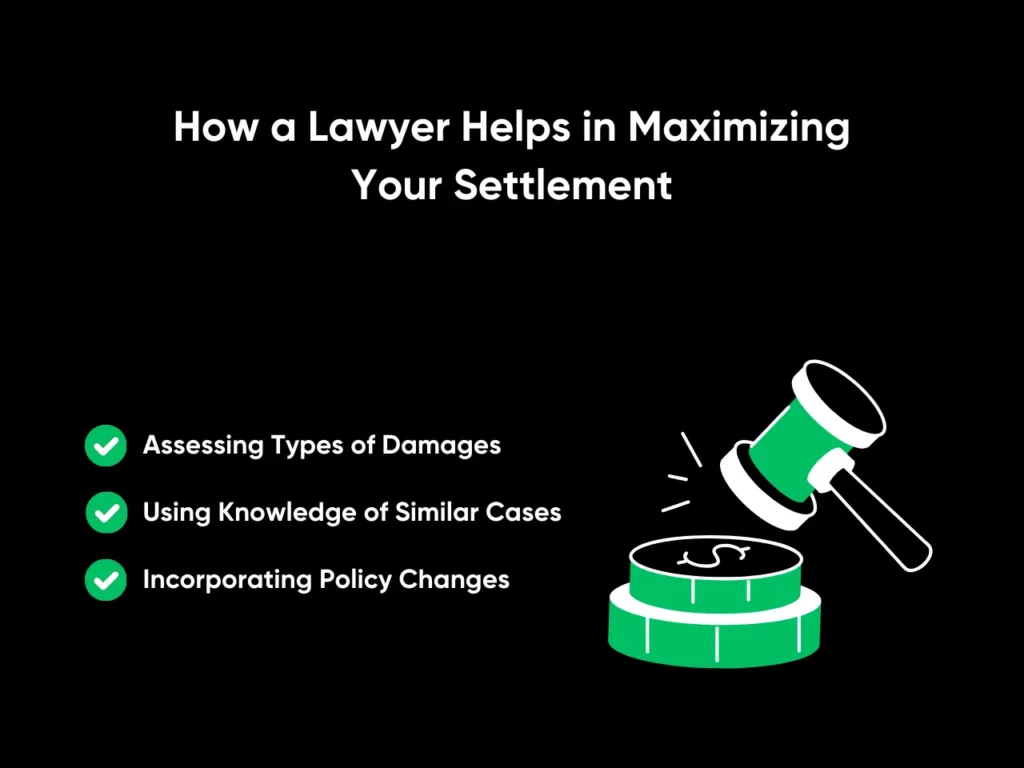
- Assessing Types of Damages: Beyond lost wages, an attorney considers the full severity of the discrimination, including emotional distress. A good employment law firm can also bolster the strength of your evidence in securing other compensation, such as court costs and attorney fees.
- Using Knowledge of Similar Cases: Attorneys draw on their years of experience with similar cases and knowledge of average employment discrimination settlements to determine what’s fair for your situation. This helps you avoid accepting an undervalued offer.
- Incorporating Policy Changes: If your goal is to prevent future discrimination, your lawyer can advocate for workplace reforms, such as updated anti-discrimination policies, improved complaint-handling procedures, or any other reasonable accommodations.
How Legal Representation Empowers You
Beyond securing a fair settlement, having an experienced law firm by your side provides peace of mind and empowers you throughout the process:
- Confidence During Negotiations: Knowing you have a legal expert on your side strengthens your position in settlement discussions, ensuring you’re not pressured into unfair treatment.
- Protection from Retaliation: Lawyers are familiar with how to address retaliation or other unethical behavior during the legal process, ensuring your rights are safeguarded at every step.
- Support for Long-Term Goals: Whether your aim is financial recovery, professional restoration, or workplace reform, your attorney tailors their approach to meet your specific needs.
Final Steps and Documentation
After negotiating your discrimination settlement, the final steps are critical to ensuring that everything is accurately documented and that the agreement reflects your needs. Proper documentation and a thorough review of the terms are essential for safeguarding your rights and avoiding future complications.
Here’s what to ask for in a discrimination settlement during this critical step:
The Importance of Documentation
Careful documentation provides clarity and ensures that all aspects of your settlement are enforceable. Here’s why it matters:
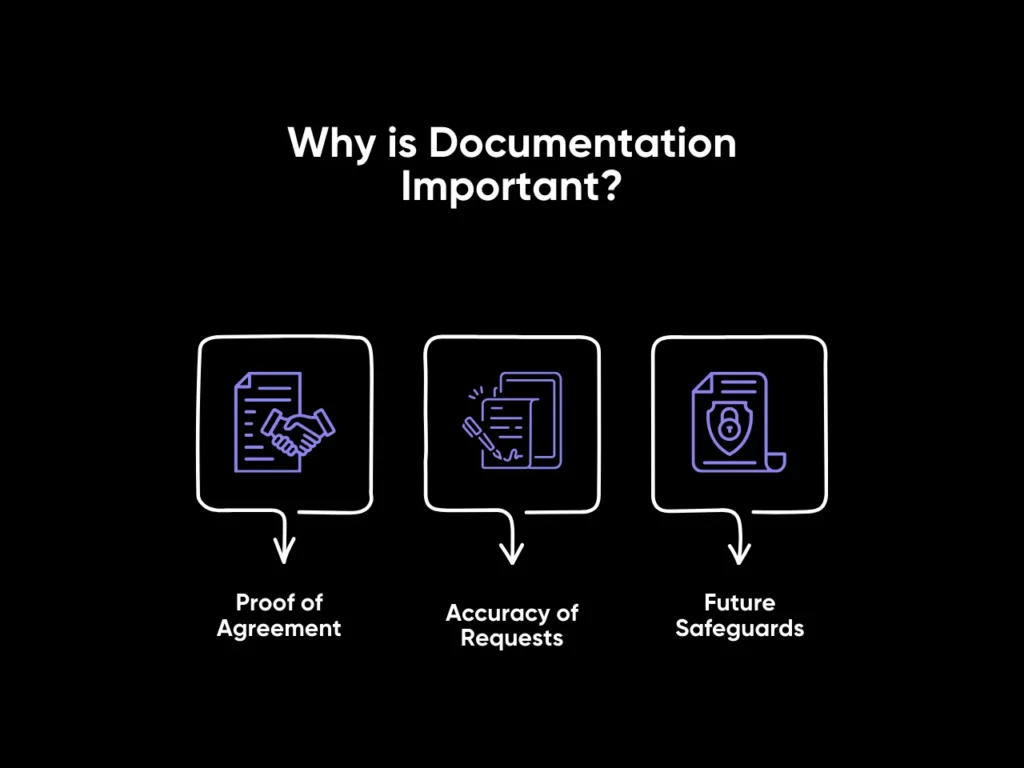
- Proof of Agreement: A well-documented settlement serves as a legally binding contract, outlining what you are entitled to and what responsibilities the employer must uphold.
- Accuracy of Requests: Documentation ensures that every request—whether financial compensation, career adjustments, or policy changes—is explicitly stated in the agreement.
- Future Safeguards: In case of disputes or non-compliance, having a clear, written agreement provides evidence to enforce your rights.
Understanding the Terms Clearly
The average settlement agreement often includes complex legal language, so it’s vital to review and understand every term before signing. Key areas to focus on include:
- Compensation Details: Ensure that all monetary awards, such as back pay, front pay, or other economic damages for emotional distress, are clearly specified, including payment amounts and timelines.
- Non-Monetary Remedies: Verify that non-financial aspects like reinstatement, career development opportunities, or policy changes are included and precisely described.
- Clauses and Conditions: Pay attention to provisions like non-disclosure agreements, non-disparagement clauses, or waivers of future claims. These can limit your ability to discuss the case or pursue additional legal actions.
The Final Review
Before signing the settlement agreement, a comprehensive review ensures there are no gaps or inaccuracies. Focus on the following:
- All Requests Are Represented: Confirm that everything you negotiated—whether financial compensation or workplace changes—is accurately reflected in the final document.
- Timelines and Responsibilities: Ensure clear deadlines for payments and actions, such as when compensation will be issued or when policy updates will be implemented.
- Legal Clarity: Review any ambiguous language that could lead to disputes in the future. Your lawyer can help clarify or revise these terms before you sign.
Considering Non-Disclosure Agreements
Most settlements include non-disclosure agreements (NDAs) that restrict you from discussing the case. While NDAs can be beneficial, it’s important to understand their impact:
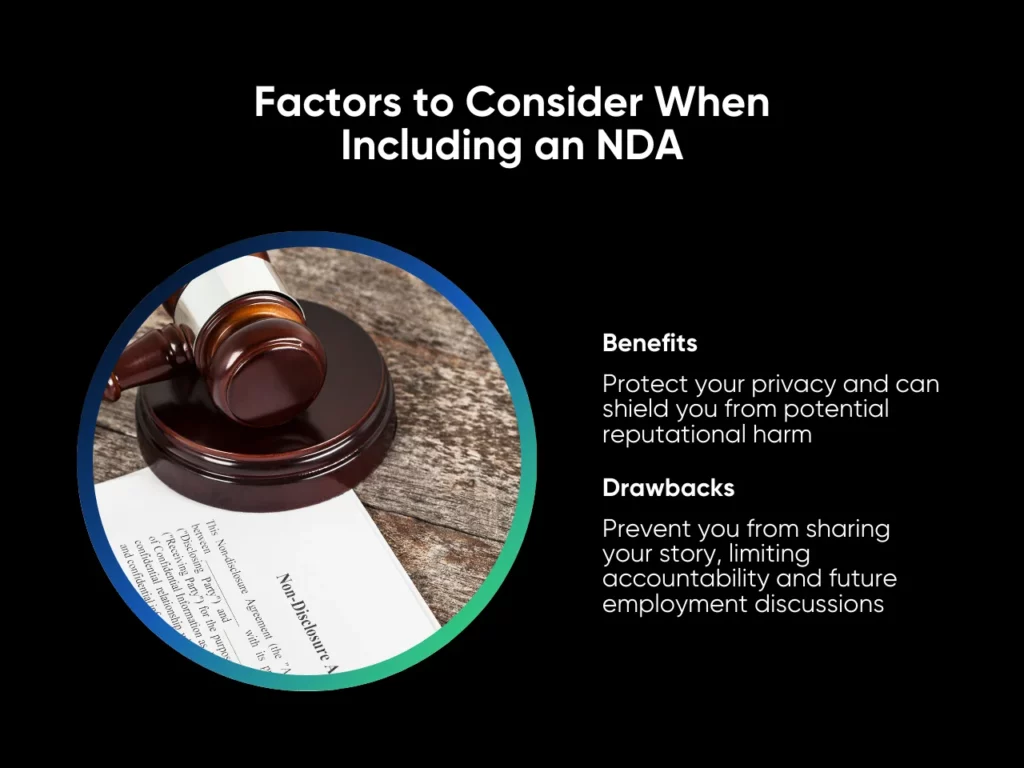
- Benefits: NDAs protect your privacy and can shield you from potential reputational harm.
- Drawbacks: They prevent you from sharing your story, which may limit broader accountability or your ability to discuss the case with future employers.
Key Takeaway
Workplace discrimination leaves lasting scars, but the right settlement can help heal both personal and professional wounds. Building a strong claim means understanding the full range of remedies available to you and ensuring every aspect of the harm is addressed. From financial recovery to workplace reforms, knowing what to ask for in a discrimination settlement is key to turning the page with dignity.
Have you considered every detail in your claim? Compensation for lost wages, emotional distress, and career setbacks is critical, but so are remedies like job reinstatement, counseling, or workplace reforms. Settlement terms like confidentiality clauses or timelines can carry hidden implications—expert legal guidance ensures nothing is overlooked.
Finding justice through a discrimination settlement doesn’t have to be complicated. Sparrow offers the guidance you need to ensure your claim covers every aspect of your experience, from financial recovery to workplace improvements. Contact Sparrow today for expert assistance, and visit our blog for more insights into workplace claims and lawsuits.

